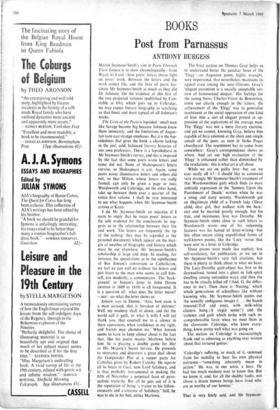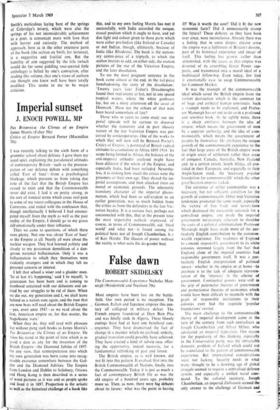Post from Parnassus BOOKS
ANTHONY
BURGESS
Martin Seymour-Smith's aim in Poets Through Their Letters is to show chronologically—from Wyatt to Frost—how poets' letters throw light on poets' work. Between the letters and the work comes life, and the lives of poets fas- cinate Mr Seymour-Smith as much as they did Dr Johnson. On the evidence of this first of the two projected volumes (published by Con- stable at 63s), which goes up to Coleridge, we may expect literary biography as satisfying as that finest and most typical of all Johnson's works.
The Lives of the Poets is lopsided : small men like Savage become big because Johnson knew them intimately, and the limitations of Augus- tan taste cast strange emphases. But it is the lop- sidedness that gives the book a charm lacking in the just, cold, balanced literary histories of our own professors. There is a lopsidedness in Mr Seymour-Smith's survey, and this is imposed by the fact that some poets wrote letters and some did not. None of Shakespeare's letters survive, so Shakespeare is out. Again, some poets wrote illuminative letters and others did not, so that Milton, whose letters are sadly formal, can only be given a page or two; Wordsworth and Coleridge, on the other hand, take up between them over a quarter of the entire first volume. I shall be very interested to see what happens when Mr Seymour-Smith arrives at Keats.
I do Mr Seymour-Smith an injustice if I seem to imply that he treats poets' letters as the sole evidence for the conclusions he sug- gests as to the relationship between their life and work. The letters are frequently the tip of the iceberg; they may be regarded as the personal documents which appear on the mar- gin of swathes of biography and history which must be cut elsewhere. Mr Seymour-Smith's scholarship is large and deep. In reading, for instance, his speculations as to the significance of Ben Jonson's conversion to Catholicism, we feel we can well do without the letters and just listen to the man who seems to call him- self, too modestly, a commentator. The 'back- ground' to Jonson's letter to John Donne (written in 1609 or 1610) is all foreground. It is a question of: what does the letter mean? —not: see what the letter shows us.
Janson says to Donne: 'Alas, how easie is a man accused, that is forsaken of defence! Well, my modesty shall sit down, and (let the world call it guilt, or what it will) -1 will yet thank you, that counsell me to a silence in these oppresures, when confidence in my right, and friends may abandon me.' What Jonson seems to have to keep silence about is the fact that, like his poetic master Marlowe before him, he is playing a double game for Her or His Majesty's Secret Service. He pretends to recusancy and discovers a great deal about the Gunpowder Plot at a supper party for Catholics given by Robert Catesby. He reports all he hears to Cecil, now Lord Salisbury, and is thus probably instrumental in making the fifth of November a perpetual feast of pyro- technic rejoicing. But all he gets out of it is the reputation of being 'a traitor to his fellow- recusants and a creature of Salisbury.' Still, he was to die in his bed, unlike Marlowe. The brief section on Thomas Gray helps us to understand better the peculiar force of the 'Elegy'—an Augustan poem, highly wrought, very impersonal, that nevertheless maintains its appeal even among the near-illiterate. Gray's 'elegant pessimism is a socially acceptable ver- sion of homosexual despair.' His feelings for the young Swiss, Charles-Victor de "Bonstetten, come out clearly enough in the letters; the achievement of the 'Elegy' was to generalise resentment at the social oppression of one kind of love into a sort of elegant protest at op- pression of the aspirations of the average man. The 'Elegy' was not a mere literary exercise, and yet we cannot, knowing Gray, believe him capable of fiery emotion at the short and simple annals of the poor, as seen in Stoke Poges churchyard. The resentment has to come from somewhere: Gray's correspondence shows .us. where. And yet our high evaluation of the 'Elegy' is enhanced rather than diminished by the revelations: this is what art is all about.
While we are on guilty love—but are we ever really off it?—I should like to commend very strongly Mr Seymour-Smith's treatment of that Wordsworthian guilt which finds its most unlovely expression in the 'Sonnets Upon the Punishment of Death,' written when he was a smug and nasty seventy. Wordsworth got an illegitimate child of a French lady ('Dear child, dear girl, that walkest with me here,' etc) and he married prosily enough, but his true, and incestuous, love was Dorothy. Mr Seymour-Smith sticks close to such letters as Wordsworth wrote—one of his redeeming features was his hatred of letter-writing—but this often means citing unpublished forms of well-known poems, like the 'Lucy' verses that were sent in a letter to Coleridge.
These poems were made less explicit, less self-revelatory, for publication, as we see in Mr Seymour-Smith's very full citations, but there is plenty to think about in what we have. The Lucy-Dorothy guilt-object has first to be desexualised, turned into a ghost or folk-spirit dwelling among untrodden ways, and then she has to be ritually killed off ('And, 0, the differ- ence to me'). Then there is 'Nutting,' which whole generations of schoolboys like without knowing why. Mr Seymour-Smith points out the sexually ambiguous images ('. . . the hazels towered/Tall and erect, with milk-white clusters hung,/A virgin scene!) and the violence and guilt which strike with such in- comprehensible force when we meet them in the classroom. Coleridge, who knew every- thing, knew pretty well what was going on.
The section on Coleridge is excruciatingly frank and as admiring as anything ever written about that tortured genius 'Coleridge's suffering, or much of it, stemmed from his inability to bear his own Physical existence—"something inherently mean in action." He was, in one sense, a hero. He had too much modesty ever to know this. But we know it, and, for all the shabby faults, not above a dozen human beings have lived who are as worthy of our honour.'
That is very finely said, and Mr Seymour-
Smith's meticulous laying bare of the springs of Coleridge's misery, which were also the springs of his not inconsiderable achievement as a poet, is consonant more with love than with horror and curiosity. The method of approach, here as in the other extensive parts of the book (the section on Swift, for instance), is a suggestive and fruitful one. But the humility of aim suggested by the title (which would do for some piddling rose-scented little anthology) is belied by one's conviction, after reading this volume, that one's views of authors one thought one knew well have been totally modified. This seems to me to be major criticism.



































 Previous page
Previous page